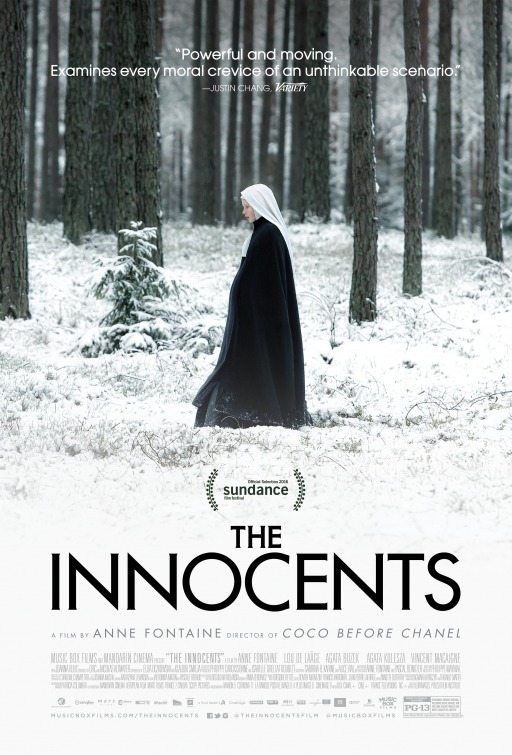It’s regrettable that a couple of prospective viewers will come into Anne Fontaine’s The Innocents carrying assumptions based off of the notoriety she achieved with her 2013 film Adoration. The latter film mightn’t have been widely seen, but the dramatic allure of having Naomi Watts and Robin Wright fuck each other’s sons certainly ensured that Fontaine’s tale of horned up middle-aged womanhood got its name recognition. It would be a shame, however, for the director’s provocative choice of material to distract from her obvious talents. With The Innocents, she brings thought and effectiveness to sombre territory.
The Innocents looks at a hideous set of acts resulting in the worst conceivable consequences. The film follows a young nurse named Mathilde (Lou De Laâge) working for the French Red Cross in Polish village in the aftermath of World War II. In December 1945, she stumbles across a situation bespeaking an extreme moral barbarity: several nuns at a local convent are pregnant after being raped by Soviet soldiers. These women need medical assistance, but the Mother Superior is devoted to upholding the ethos and rules of the convent. Mathilde’s assistance is allowed but she must minimise the disruption her presence brings upon the Convent. Obliged to avoid the outbreak of scandal, Mathilde is forced to keep this situation hidden from the Red Cross.
Casting Lou De Laâge to play Mathilde works out to be a shining decision – a relief, given that the focus on Mathilde’s personal life are among the film’s weakest and add little to the film’s dramatic weight. Mathilde’s lover Samuel (Vincent Macaigne) is on screen for too long, his presence never really justifying itself but for a well-timed crack about being one of the few Jews left in Poland. A lingering focus is placed upon Mathilde’s atheistic upbringing and her allegiance to communism, but these details contribute more to the film’s broader narrative discourse than they do to the interest she generates as a character.
There’s hints of an outright rejection of religious doctrine in The Innocents. It’s the stubborn aversion to modernity that keeps the nuns disempowered, and the convent’s Mother Superior is the film’s symbol of religious arrogance; she’s so stubbornly devoted to the convent’s internal rules she’ll uphold them regardless of unfatho mably awful path it leads her on. Yet, through showing us Mathilde’s doubts about her own beliefs and mode of existence, the film retains its sympathy for the nuns’ way of life.
mably awful path it leads her on. Yet, through showing us Mathilde’s doubts about her own beliefs and mode of existence, the film retains its sympathy for the nuns’ way of life.
The Australian release of The Innocents comes shortly after the release of Martin Scorsese’s Silence, another film that explored faith under siege. Fontaine, however, takes the same spiritual themes and draws them into the feminine experience. Not only does The Innocents explore the struggle to maintain faith despite God’s silence, it locates the specific ways this struggle plays out for the more forgotten group of His children – His daughters. The nuns in this film bear the brutal consequences of Soviet control and their religious devotion. In contrasting the treatment of the nuns by their Mother Superior at the Convent with their initial treatment by the Soviet soldiers, The Innocents postulates that two major institutions competing for Poland’s soul for half of the twentieth century – the secular Soviet Union and the Catholic Church – had a capability for monstrous cruelty.
The Innocents benefits from the beauty of its location; shots of nuns running through the snow-covered forests burn in the mind long after the film’s end (although it’s a source of heartache that the picture wasn’t shot on film – we have a very sad future ahead). If there’s one truly lazy piece of filmmaking in The Innocents, it’s undoubtedly the poorly executed and narratively awkward scene where Mathilde is subjected to an attempted rape by a group of Soviet soldiers on her way back from the Convent to the village. The soldiers’ nearby superior officer eventually breaks the danger, but his proximity begs the question of why they would attempt the act in the first place. Mathilde is free to leave the scene and left with a heightened appreciation of what the nuns went through (as if the trauma of their situation wasn’t already conveyed to her before). It’s a bafflingly shocking bit of screenwriting, given that the film is otherwise quite intelligent and had four people working on the script.
The Innocents might wrap its threads up a bit too neatly for some. Viewers and critics of The Innocents have drew the inevitable comparisons to Pawel Pawlikoski’s Polish nun road movie Ida (2013), which ended on a more ambiguous note. It makes sense, however, for Anne Fontaine’s film to come to different conclusions: its narrative structure is not one that easily lends itself to the open-ended questions of the road film. Above all, The Innnocents deals with the experience of entrapment – spiritually, emotionally and physically – and does so with skill, intelligence and competence.
The Innocents is now showing at select theatres, and is distributed by Rialto Distribution.
